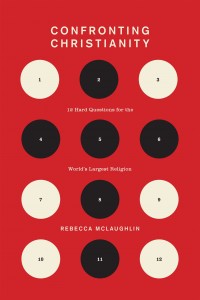I’m not quite done with C.C., but will finish today. It is a solid read, a fun book for a Christian to absorb and in a fun way, makes us confront today’s secular world’s skepticism about a faith that has been answering similar questions for 2000 years.
I don’t claim to be a book reviewer. In fact, I usually don’t write reviews of books – love ’em or hate ’em – due to time constraints. But when I DO review a book, I usually don’t thoroughly read every word, every chapter. I read the opening chapter or two, skip around, get a sense of where the author and story are going, confirm my intuition with a random stab or two at deeper sections of the tome, then write my thoughts. I wanted to do this approach with CONFRONTING CHRISTIANITY, but got drawn in very early into Rebecca McLaughlin’s writing style and the way she treated her material.
The premise of C.C. is that Christianity has become a whipping post for secular humanists and that their criticisms require answers. McLaughlin provides answers to some very challenging questions. Doesn’t Christianity degrade women? Isn’t this faith outdated by science? How can we literally take the Bible at its word? How could a loving God send people to hell?
If a Christian is unprepared to answer these and other questions, what will happen to our faith in another generation or two into the future? Ms. McLaughlin not only provides answers; she documents – like a PhD would be expected to – the supporting evidence.
I mentioned that I failed at skipping around this book to get a summary of where the author is going. This is because the book reads like a crime novel to me. Despite my own Christian beliefs, I half-believed many of the charges against Christianity posed in the author’s 12 questions. Or – more likely – never confronted them with my own research and response. Ms. McLaughlin fairly presents the questions / arguments that suppose Christianity is on the wane, quoting sources that support the claim. But then, she pauses, catches a breath and presents the facts that support the Christian religion and documents her answers. Despite my desire to finish the book quickly in my hit-and-run assault on the contents, I put aside all my other books for a couple of days and concentrated my energy on this can’t-put-down book. (OK, who among us only reads one book at a time? Yeah – I didn’t think so!)
I’m not quite done with C.C., but will finish today. It is a solid read, a fun book for a Christian to absorb and in a fun way, makes us confront today’s secular world’s skepticism about a faith that has been answering similar questions for 2000 years.
About the Author
Rebecca McLaughlin holds a PhD in renaissance literature from Cambridge University and a theology degree from Oak Hill College in London. She is cofounder of Vocable Communications and former vice president of content at the Veritas Forum, where she spent almost a decade working with Christian academics at leading secular universities.
Rebecca grew up in London and she met her husband, Bryan, when they were both in grad school at Cambridge. Bryan comes from Oklahoma and they now live in Cambridge Massachusetts, with their three children.
You can follow Rebecca on Twitter and Instagram @RebeccMcLaugh or on her website: www.rebeccamclaughlin.org.
Book Details
- Hardcover: 240 pages
- Publisher: Crossway Books (April 7, 2019)
- Language: English
- ISBN-10: 1433564238
- ISBN-13: 978-1433564239
- Product Dimensions: 6 x 9 inches
- Shipping Weight: 1 pounds
- Average Customer Review: 36 customer reviews
Christianity is the most widespread global belief system, and promises to remain so well into the future. But for many educated westerners, biblical Christianity is a dangerous idea―challenging some of their deepest beliefs.
Channeling state-of-the-art research, personal stories, and careful biblical study, Confronting Christianity explores 12 questions that keep many of us from considering faith in Christ. Look more closely, McLaughlin argues, and the reality of suffering, the complexity of sexuality, the desire for diversity, the success of science, and other seeming roadblocks to faith become signposts. Jesus becomes not a relic from the ancient world, but our modern world’s best hope.



